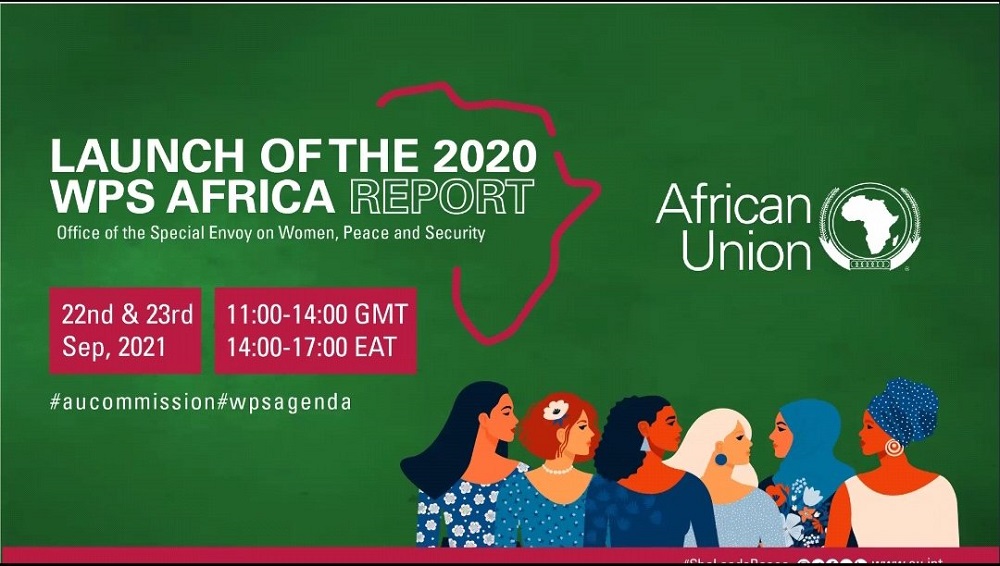The Peace Centre joined the launch and dissemination of the 2020 report of the Chairperson of the African Union Commission on the implementation of the Women Peace and Security Agenda in Africa. This was hosted virtually by the Office of the Special Envoy for Women, Peace, and Security and attended by the Member States and other stakeholders on 22nd and 23rd September 2021. This is the second report based on the progress reports from regional economic communities and member states, developed using the Continental Results Framework (CRF). The meeting also launched the process of writing the 2021 Presidency Report on Women, Peace and Security. The two-day launch, which was a follow-up to the December 2019 meeting in Dakar, Senegal, was attended by high-level representatives from the Member States, regional economic communities/mechanisms; the United Nations, civil society organizations, centres of excellence, and gender networks.
In October 2020, we celebrated the twentieth anniversary of the landmark UNSCR 1325 on women peace and security, the founding resolution of the progressive normative agenda on WPS. In 20 years since UNSCR1325 was passed, significant efforts towards its implementation have been made including the adoption of national and regional level strategies, policies, laws, institutions, and action plans. In Africa for instance, as of December 2020, thirty (30) countries had adopted a National Action Plan (NAP), making Africa the continent that is leading in the globe with 54.5 percentage of NAPs. In addition, six (6) Regional Economic Communities/Regional Mechanisms have also adopted Regional Action Plans, these include IGAD, ECOWAS, ECCAS, ICGLR, Mano River Union and SADC.
However, the question of whether implementation is happening effectively or not remains. To address this question in Africa, the African Union Peace and Security Council (PSC) mandated the Office of the Special Envoy of the Chairperson of the African Union Commission on Women, Peace and Security (OSE) to develop a Continental Results Framework (CRF) to monitor the implementation by AU Member States and other relevant stakeholders of the various instruments and other commitments on Women, Peace and Security in Africa.
Following wide consultations with Member States and Regional Economic Communities (RECs) that had developed Action Plans for the implementation of the Women, Peace and Security (WPS) agenda, the CRF was developed and validated by Member States on 29 March 2018 and adopted by PSC on 16 May
2018. In 2019, OSE produced the first report of the Chairperson of the African Union Commission (AUC) on the implementation of the Women, Peace and Security Agenda in Africa, based on reports submitted by Member States using the CRF. Through consultations with Member States, RECs, and civil society, OSE finalized the preparation of the 2020 report of the Chairperson of AUC on the implementation of the Women, Peace and Security Agenda and convened a dissemination forum to exchange best practices on monitoring and reporting on WPS agenda including in COVID-19 pandemic times.
The Launch followed an agenda that included; an opening ceremony attended by Ms. Ouriatou Danfakha, representing the President of the African Union Commission, HE Moussa Faki Mahamat; Ms Bineta Diop, Envoy of the African Union Commission for Women, Peace and Security, Ms Letty Chiwara, Representative of UN Women in Ethiopia, AUC and Economic Commission for Africa; HE. Ambassador Jessye Lapenn, United States Ambassador to the African Union and Permanent Representative of the United States to the United Nations Economic Commission for Africa; HE. Ambassador Bankole Adeoye (represented by Ms Nadia Roguiai)
The meeting also included the reporting for 2020/2021 and presentation of the revised CRF reporting guide, a discussion on WPS coordination practices, challenges and opportunities, the role of civil society in advancing the women, peace and security agenda in Africa. The Launch concluded with a closing ceremony moderated by The Peace Centre’s Helen Kezie Nwoha. The closing remarks were presented by Ms Odette Kabaya, UNDP Gender Regional Adviser and Team Leader on GEWE; H.E. Ambassador, Bard Hopland, Norway Ambassador and Permanent Representative to the African Union; H.E. Ambassador Fatima Kyari Mohammed, AU Permanent Observer to the United Nations, New York; Mme Bineta DIOP AUC Special Envoy on Women, Peace and Security. They all lauded the effort towards the launch of the 2020 WPSA Report and the enormous contribution from Member States and partners for their continuous endeavour and advocacy for the advancement of women and peace in society.
A summary of the report was shared, highlighting the results in the four core pillars:
- On participation:
The participation of women at the highest levels of decision-making was still very low compared to men of the same rank and still very low for many governments that do not reach the 30% threshold. - On protection:
Findings indicated that 84% of the Member States reported protection initiatives against Sexual and Gender-Based Violence (SGBV) such as training, awareness-raising and survivors’ response mechanisms
In countries with sectoral equality policies in the defence and police ministries, the number of women in the police and military service increased. However, the member states did not provide data on the participation of women in peacekeeping, mediation and peace negotiations. Efforts are needed to monitor these areas. - For prevention:
Findings show that 46% of Member States with NAPs presented evidence of incorporating Women Peace and Security perspectives into early warning and response systems. A primary concern was that gender-specific components in early warning systems (EWS) were not monitored and evaluated. Several new threats were not highlighted in the CRF, namely: climate change, COVID19, refugees, and internally displaced women and girls. - Under relief and recovery, women’s participation in post-conflict recovery programmes is still low eg in the Central African Republic, only 13% of women benefited from disarmament & demobilization & only 37.37 % benefited from economic recovery programmes



